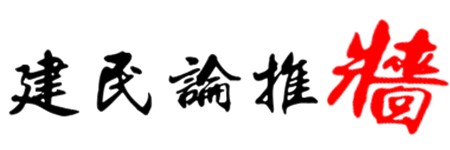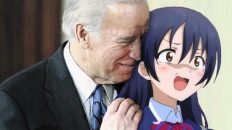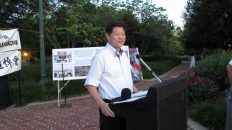Hello everyone!
Today is December 28, 2018. I am here to turn in my homework in history. In today’s program, I would like to talk about the former U.S. Secretary of State James Baker.
For those who have been following my program for a long time all know that I had been searching for the former U.S. Secretary, Mr. James Baker. Today, I am delighted to share with you that I have found him.
On a very special day this past fall, I had met with Mr. Baker. After this cordial meeting, I had been meaning to do a special about it, but I have been so busy since then. There is the Sino-US trade war, and later on the scandal of Huawei and the arrest of Meng Wenzhou. Every day there has been massive coverage of these events from all the channels of current politics. Therefore, I had not found time to share with you my meeting with Mr. Baker. Now that the end of the year is drawing near, I simply cannot drag it on any longer. With today being December 28, this year is coming to an end. I want to dedicate today’s program to recounting of that meeting before the year comes to an end.
So, what is the story between James Baker and Jianmin? Some of you have a good understanding of it after having watched my program for an extended period of time. Some of the more recent friends may not have any idea. With today’s program, I will let you know all about the connection between Mr. James Baker and me.
It all started in 2016. One day in 2016, a friend of mine who had moved to HongKong many years ago, sent me a message, asking me to go watch a video of Li Ao. I had never thought highly of Li Ao because of his pro-communist stance. In the second half of his life, Li Ao completely threw himself into the arms of the Communist Party whom he spent every single day singing for, especially when he publicly voiced his shameless opinions against all the patriotic students during June 4. He was just a scummy writer from Taiwan who defended Deng Xiaoping for the barbarian slaughtering policy by his party. I never watched his programs. Yet my friend told me, “This one you have to watch, especially at the 7’4” of the video.” I asked “What on earth is this program?” It turned out that Li Ao talked about the June 4 Massacre citing a memoir called <Ten Episodes of China’s Diplomacy> written by the former Chinese Vice Premier and the Foreign Minister Qian Qichen.
When Li Ao talked about this memoir by Qian Qichen, he not only introduced it to all the readers, but also talked about his personal judgement of June 4. A little historical episode mentioned in this book was captured by my friend, because it mentioned my name, Wu Jianmin, as a historical figure in it. Per Qian Qichen’s memoir, Wu Jianmin refers to the one who was the Director of the Information Department and the former ambassador to France. My friend saw through Qian’s words as a lie, because he is aware that the historical figure “Wu Jianmin” the book truly refers to should be me. So he urged me to go watch the program to clarify the facts. That is how I managed to watch Li Ao’s program.
Li Ao made it quite clear in his program that the then U.S. Secretary of State James Baker was sent by U.S. President Bush Sr. and came to China to initiate diplomatic negotiations with the Chinese Communist Party. He was received by Qian QiChen, the Vice Premier and the Foreign Minister. During the meeting, when Mr. Baker mentioned Human Rights, he took out a list of political prisoners under prolonged imprisonment by the Chinese Communist Party. Among the list was my name: Wu Jianmin.
Qian Qichen did a sneaky swapping trick with the Wu Jianmin who was his Director of the Information Department of the Foreign Ministry and the former ambassador to France. Qian told Mr. Baker, “You’re mistaken! You’ve got the wrong name! The ‘Wu Jianmin’ you talk about is not a young student, nor a students’ leader during June 4. He is not arrested or put in jail. The ‘Wu Jianmin’ you are thinking is our Director of the Information Department. You got the wrong person! It’s such a rookie mistake that the name of our Director of the Information Department made its way to your list of political prisoner. Are you serious?!” Therefore, a sneaky trick was done swapping two men with the same name.
In order to ease the embarrassment in the diplomatic negotiations, Mr. Baker said to Wu Jianmin the Director of the Information Department, “Wow, you’re out already?” According to Qian Qichen, the room roared with laughters.
After his retirement, this episode was recorded by Qian Qichen as diplomatic wisdom into his memoir <Ten Episodes of China’s Diplomacy>, which was published in 2003 and again in 2008 and 2010. It sold millions copies and is a book on diplomacy required to be studied by the state officials from all the administrative departments of the Chinese Communist Party. Just like its name, Qian records the top ten major events in his diplomatic career, and when talking about the Sino-U.S. interactions on June 4, I was mentioned as one of the episodes.
Of course, this whole thing was bragged as a witty crack in diplomacy, but what are the facts and history? After watching the video of Li Ao, I immediately found this memoir by Qian Qichen. In its Chinese version, on the pages of 190 and 191, Qian talks about this episodes in details. In other words, Mr. Baker provided a long list of political prisoners during his visit to China, asking the Chinese Communist Party to first release everyone on this list of political prisoners as a measure to improve its Human Rights status. My name was on top of this list, but was swapped with the Wu Jianmin the Director of the Information Department of the Foreign Ministry as a dirty trick play by Qian Qichen.
As everyone is aware of, “that” Wu Jianmin was in his 50s at the time, the Director of the Information Department. But the Nanjing students’ leader during June 4,1989 was only in his 20s. Swapping someone in his 20s with someone in his 50s, Qian thought Baker would not see through the stupid game. One has to wonder if Mr. Baker did or did not? Obviously, this had remained a mystery to me. Before I had a chance to meet with him, I had no way of knowing for sure if Mr. Baker was fooled by Qian Qichen and that Wu Jianmin.
Therefore, after reading the memoir and watching the video, I wrote and published an article at the Bowen News Agency in April 2016. In this article, I countered the lies made up by Qian Qichen, the former Foreign Minister of China. After my article was published, many friends started following this story and asking me about what really happened. As a matter of fact, Qian’s memoir and Li’s video did bring back some of my recollections of what happened.
As you know, during June 4 Massacre of 1989, it was George Bush Sr. who was the President of the United States. At this time, June 4 Massacre took place. Deng Xiaoping started the bloodshed by slaughtering the students. The Tiananmen Square Massacre shocked the world watching the tanks rolling over people. After this Massacre, any bit of legality of the Communist Party’s regime that had previously been lingering around was eradicated once and for all.
At the time, all the western world unanimously sanctioned China, unanimously resisted China and unanimously demanded the Communist Party to end the one-party dictatorship. The United States was the at the frontline of this wave of sanctions, leading other countries guarding world peace. Bush Sr., as the then U.S. President, he should have led the world imposing harsh sanctions against the Chinese Communist Party for its atrocities committed in the bloody killings during June 4 Massacre, and called for the ending of the fascist regime.
Yet what did Bush do? On the one hand, he led the global sanctions against China superficially. On the other hand, he tried reaching deals with Deng Xiaoping behind the scene by secretly sending his envoy to China. At the end of June 1989, he sent his National Security Advisor to Beijing. At the end of 1989, the Advisor came again. What did the Advisor want to accomplish from both trips?…… only one thing, which was to assure Beijing that “Everything will pass and peace will return. We might impose temporary sanctions against you, but in the end we want to be on your good side.” By blowing from both sides of his mouth, Bush not only betrayed the political values of the United States, but also betrayed moral values of America. The way President Bush responded to the Massacre along with all his handlings afterwards, are condemnable crimes against Chinese people!
President Bush considered himself an expert of China. Indeed, he spent a good many years dealing with China during his political career. When President Nixon started contacts with the Chinese Communist Party in early 1970s, there was no diplomatic relationship between Beijing and Washington. Soon afterwards, George Bush was appointed as the head of the U.S. Liaison Office in Beijing, or the de facto Ambassador. During the years of assuming his role as the head of the Liaison Office, George Bush was able to get to know a lot of top leaders in the hierarchy of the Chinese Communist Party. From the early 70s till 1979 when U.S. established diplomatic relationship with China, which George Bush worked all the way through during those years, he managed to build solid personal friendship with many Chinese leaders, and such personal relationship hindered his better judgement down the road.
After he became the President of the U.S., having seen such inhumane and atrocious massacre in human history took place on June 4, 1989, George Bush still shielded the Chinese Communist Party from being condemned. He hoped to pull China out of the quagmire, so while he launched a superficial sanction leading all the countries, he cut a deal in the backstage with the Chinese Communist Party by telling them the storm would be over and he intended on keeping up the “friendship” with China. He wanted to let China regain its opportunity and maintain the transactions with U.S. in terms of economics, trade and politics. He hoped to pull China out of swamp, which counted for his unforgivable assistance to an evil regime.
This is why when George Bush passed away not so long ago, I barely had anything positive to say about him. It is because I think as a U.S. President, to shamelessly foster communism by helping the Chinese Communist Party, is completely against the Human Rights values of America and a total betrayal of the world civilization. It was because of Bush’s continuous efforts that the Chinese Communist Party was able to recover from the verge of death.
Under the circumstances as such, Mr. James Baker came to China with an ice-breaking mission as the envoy and the Secretary of State sent by President Bush. His visit took place in November of 1991. Mr. Baker came to China with three major tasks.
First of all, the Sino-US economic-trade relationship, or if China and U.S. were able to re-establish their economic and trade relations, if the sanctions against China could be lifted and enable the two countries to do business again. This was on the top of the agenda.
Second of all was to determine if the Chinese Party Secretary Jiang Zemin could successfully visit U.S. At the time, the Sino-US relationship deteriorated due to the sanctions. There was hardly any possibility for him to visit the U.S. However, Jiang Zemin was really hopeful he could have an opportunity to visit the U.S. through warm gestures and flirts with the U.S. This was the second priority of Mr. Baker’s visit.
Third of all was the Human Rights issue. During the global sanctions against China, mainly targeting against China’s Human Rights status, Mr. Baker’s mission was that he hoped China could release all the political prisoners on his list. There were many people on that list, and I was one of them. Hence, after his arrival in China, Mr. Baker tried to accomplish these three missions through talks with Qian Qichen.
What was the final result of the talks? The final result was that the Sino-US economic relationship was smoothly restored and the sanctions against China successfully lifted. Jiang’s visit to the U.S. was also on their agenda. The only thing that was total failure was the release of the political prisoners, especially the release of Wu Jianmin, when my name was mentioned. The whole issue passed over just like a rain storm with the swapping of me with the Director of the Information Department, a sleazy game rigged by Qian Qichen.
When all this happened, I was serving my sentence in the Dragon Pond Prison in Jiangsu Province. I had no idea of such negotiation between Washington and Beijing, much less of the fact that my name was mentioned by Mr. James Baker in his talks with ZhongNanhai. Personally, I had no knowledge of any of this. Only after reading Qian Qichen’s memoir, some of my memories started to make sense.
About the end of November in 1991, I may not recall the time accurately but it was winter time for sure. A few people claiming to be “from some department” came to the prison to visit me. They had a serious conversation with me, which was urging me to plead guilty to the government, change my reactionary stance, and have a deep review of my crimes which needs to be put in writing, then I could possibly be released, maybe even be sent overseas for medical treatment.
At the point, I was quite confused with the purpose of their visit. I was complete at a loss when they told me, “If you continue on your path of sins, no one could come to your rescue, not even President Bush! Not even Baker!” I thought to myself, “Who’s Bush? He’s the U.S. President! Why would he want to rescue me? How the heck could he know me? How is it possible he would rescue me???” I didn’t take it seriously at all. I had never imagined in my wildest dream that my name was indeed on the rescue list of the Secretary of State sent by the U.S. President!
I let the whole thing go without thinking any further, until I read Qian Qichen’s book and recalled all those words.
After my article was published in 2016, many people emailed me and called me, asking if I wanted to search for the few people directly involved in this whole thing, because they were all still alive. I said, “Of course I do, very much so.” The two Chinese involved, Vice Premier Qian Qichen and the Director of the Information Department Wu Jianmin, had both retired since. It would not be difficult to locate them, except if I were to try myself or do so through friends, they would have none of me.
My only hope was to search for Mr. James Baker.
An incident beyond belief happened at this time. After I found out what had happened (from the book and the video), I started my hard efforts of searching Mr. Baker. At this point, the Wu Jianmin who shared the same exact name with me, the Director of the Chinese Foreign Ministry, the Ambassador, died in 2016 in a car accident on his way to Wuhan for a symposium, which added a sudden uncertainty to my quest of truth. He was actually the youngest amongst the three people directly involved in this, and who had the biggest potential to restore the truth of history. It was a shame he died so abruptly.
Actually, this Ambassador turned out to have quite a bit of connections with me. I am from Nanjing, so was he. In addition to this, we came from the same school. He graduated from the No. 2 Middle School of Nanjing, so did I. We studied and graduated from the same school. Of course, he was much older than me, about 30 years my senior. He graduated way ahead of me and was accepted by Beijing Diplomacy Institute. He had long since become a government representative and assumed the role of Ambassador of many countries, and the head of the Beijing Diplomacy Institute. Then he died in the car accident in 2016.
His death stroke one name off the responsible ones in my quest of truth. After a few months, in the April of 2017, Qian Qichen himself died. That means out of the few who participated in the (Sino-US diplomatic) negotiations, James Baker would be the only one still alive. The search for Mr. James Baker had become my wish of life. I had tried various resources and channels to find Mr. Baker, but the luck was not on my side, until this year.
This year, one of my friends finally was able to get in contact with Mr. Baker’s assistant. When Mr. Baker read the books about this part of history and found out that the Wu Jianmin he tried to rescue is now in the U.S., he was very excited. So our meeting was arranged and Mr. Baker and I met this fall in Houston, Texas. We met at Baker’s Institute in a well-known university in Houston. Mr. Baker and I had a wonderful talk and luncheon together.
On that day, many of the mysteries lingering in my mind for years were resolved. During our meeting, Mr. Baker showed me Qian Qichen’s book and told me delightfully that he had read it many times. He was totally able to recall many details of that historical event.
At 88 years old, Mr. Baker appears to be in excellent health for his age and talks with great wits and eloquence. He told me that after reading Qian’s memoir, a lot of details in his memory came back to him. He recalled in details what President Bush assigned him as tasks, how he went to China and carried talks with Qian Qichen, how his demands and requests were taken by Qian, and what his better judgements were as a result. My biggest question to him was, “When Qian told you that Wu Jianmin was the Director of the Information Department and you were mistaken about the list of the political prisoners, how much did you decide to believe his words?”
Mr. Baker told me, “I instantly realized it was a big act. I realized that it could not possibly be the right Wu Jianmin, not only because people could have the same names, but also all the lists were submitted to us by the State Department per the information gather from the FBI. We were fully aware of everyone’s background information including their names, resumes and experiences, as well as the status of their imprisonment. How could it be remotely possible that the one we were asking for was the Director of the Information Department?! What we asked for was a leader of the students, who was in his 20s or 30s. This Director of the Information Department was almost 60 years old! So I immediately knew they were lying. The only thing was that I could not quite come out to say so, because I had other more important tasks assigned by the President. I felt that the negotiations were just starting and more opportunities were down the road. Plus there were many many political prisoners on our list presented to the Chinese Communist Party. We wanted to ask for speedy release in batches and over time.”
The meeting with Mr. Baker answered many questions that had been bottled up for so many years, and needless to say, accomplished my wish in life, which was to meet with Mr. Baker during our lifetime, and able to recall and witness this historical event together. As time floats by, many historical events call for those of us involved to accurately recall as many details as possible in order to complete the record for the history.
Even though I am only one of the witnesses of the June 4 Students Movements for Chinese Democracy, but what happened to me as a political prisoner, especially when the U.S. Secretary of State asked for the release of the political prisoners during his visit to China, had been recorded by me to its totality. I hope that all the people involved in June 4 Massacre and would be able to follow the footprints of the history, verify the details of the historical events, search for the truth of history via different ways, restore all the truths of what happened, and mark them all, so that our children and their children can all remember this part of history.
It has been almost 30 years since the June 4 Massacre, the bloody debt has not been paid back. The executors like Deng Xiaoping and Li Peng have not paid for their crimes committed. Yuan Mu, the spokesman of Chinese State Department for June 4 had successfully gotten away with the trial by justice ( because he died). However, the door of history will not be shut! Everyone who owes debt in blood will be served with justice! I firmly believe that, be it Deng Xiaoping, Li Peng, Chen Yun, Jiang Zemin, or people like Yuan Mu, everyone whose hands are soaked with blood from people, will eventually all walk towards the doom and take the stand of trial served with justice by people.
So much for my story with Mr. Baker. My meeting with him hopefully laid the ground for a budding friendship. Therefore, I think that I would be visiting Mr. Baker at another appropriate time, talking about history and future.
I expect that democracy and freedom will soon be reality in China, so that people who are part of the history, people who are like Mr. Baker, can live to see that freedom, democracy and civilization give the dignity to the 1.4 billion people in China, just what they deserve as everyone else does.
So much for today’s program. So much for watching!





添加评论